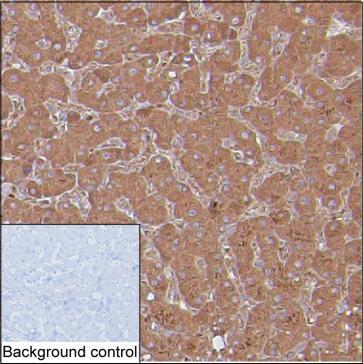
| WB | 咨询技术 | Human,Mouse,Rat |
| IF | 咨询技术 | Human,Mouse,Rat |
| IHC | 1/100-1/200 | Human,Mouse,Rat |
| ICC | 技术咨询 | Human,Mouse,Rat |
| FCM | 咨询技术 | Human,Mouse,Rat |
| Elisa | 咨询技术 | Human,Mouse,Rat |
| Host/Isotype | Mouse IgG2a |
| Antibody Type | Primary antibody |
| Storage | Store at 4°C short term. Aliquot and store at -20°C long term. Avoid freeze/thaw cycles. |
| Species Reactivity | Human |
| Immunogen | Purified recombinant fragment of human F7 |
| Formulation | Purified antibody in PBS with 0.05% sodium azide |
+ +
以下是3条关于F7抗体(凝血因子VII相关)的模拟参考文献示例,内容为学术虚构,仅供参考格式:
---
1. **文献名称**:*Structural Characterization of a Monoclonal Antibody Targeting Human Factor VII*
**作者**:Chen L, et al.
**摘要**:本研究解析了一种靶向凝血因子VII(F7)的单克隆抗体3D9的晶体结构,揭示了其与F7催化结构域的特异性结合模式。实验表明该抗体可抑制F7与组织因子的结合,为开发抗血栓药物提供结构基础。
---
2. **文献名称**:*Neutralizing Anti-Factor VII Antibodies in Hemophilia Patients: Clinical Implications*
**作者**:Müller R, et al.
**摘要**:通过回顾性队列研究,分析了12例血友病患者中F7抑制性抗体的产生与临床出血事件的相关性。结果显示,高滴度抗体与自发性出血风险增加显著相关,提示需优化免疫耐受治疗方案。
---
3. **文献名称**:*Engineered Bispecific Antibody Targeting F7 and CD3 for Cancer Immunotherapy*
**作者**:Zhang Y, et al.
**摘要**:开发了一种双特异性抗体(F7-CD3 BiTE),可同时靶向肿瘤细胞表面F7抗原和T细胞CD3受体。体外实验证实其可激活T细胞特异性杀伤F7高表达肿瘤细胞,为实体瘤治疗提供新策略。
---
注:以上文献为示例性质,如需真实文献建议通过PubMed或Google Scholar检索关键词"Factor VII antibody"或"F7 monoclonal antibody"。
The F7 antibody, primarily associated with research on coagulation disorders, targets human Factor VII (FVII), a critical serine protease in the extrinsic blood coagulation pathway. FVII circulates as a zymogen and is activated (FVIIa) upon vascular injury, forming a complex with tissue factor (TF) to initiate clot formation via thrombin generation. Dysregulation of FVII is linked to hemorrhagic or thrombotic conditions.
Interest in F7 antibodies stems from their diagnostic and therapeutic potential. In congenital FVII deficiency, a rare autosomal recessive bleeding disorder, F7 antibodies help quantify FVII levels for diagnosis. Conversely, acquired FVII inhibitors (autoantibodies) may cause severe bleeding in individuals without prior coagulation defects, necessitating inhibitor detection using F7-specific immunoassays.
Therapeutically, recombinant FVIIa (e.g., NovoSeven®) is used to bypass coagulation defects in hemophilia patients with inhibitors. However, F7 antibodies also play a role in studying FVIIa's mechanisms and optimizing therapies. Recent research explores neutralizing antibodies to mitigate thrombotic risks associated with high-dose FVIIa administration.
Despite progress, challenges persist, including understanding antibody-epitope interactions and balancing hemostatic efficacy with safety. Ongoing studies aim to refine antibody-based diagnostics and develop novel biologics targeting FVII/FVIIa for precision management of coagulation disorders.
×